@LITTLEROCKFAMILYDENTALCARE
Follow Us On InstagramDental Implants Little Rock
New Teeth That Will Last

Tooth replacement has been practiced for centuries, but in 1965, an entirely new way to restore the smile was born. In the past few decades, dental implants have quickly become the new gold standard for prosthetic teeth, offering stability and numerous health benefits that you can’t receive from traditional bridges or dentures. Here at Little Rock Family Dental Care, we can handle both the placement and restoration of dental implants; in Little Rock, AR get in touch with us today to set up an initial consultation to determine whether this treatment is right for you.
Why Choose Little Rock Family Dental Care for Dental Implants?
- Skilled Oral Surgeons and Prosthodontist
- Open on Saturdays at Our West Location
- State-of-the-Art Facility
What is a Dental Implant?
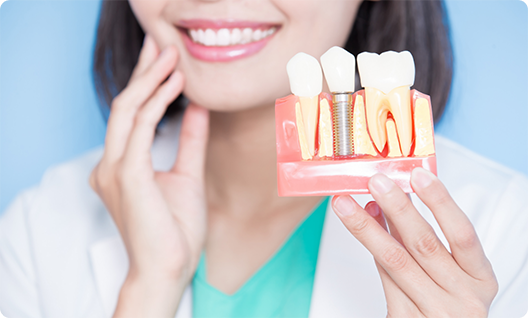
It’s inaccurate to say that a dental implant itself replaces a tooth; that job actually falls to a crown, a bridge, or a denture that is eventually placed on the implant. The implant itself – which can be cylindrical or shaped like a screw – is closer in function to a tooth root, securing the restoration to the jaw and providing the bone with essential stimulation to prevent it from breaking down. A device called an abutment is used to link the implant and restoration together.
4-Step Dental Implant Process
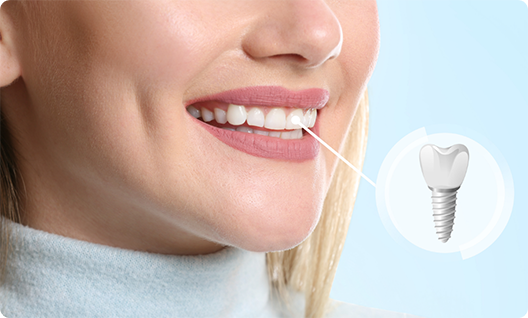
At Little Rock Family Dental Care, every step of the dental implant process is completed in-house. You don’t have to worry about having a stranger perform surgery on your smile; our in-house oral surgeons and the team that you’re already familiar with will take care of everything from start to finish. No two implant treatments are exactly alike, but normally, the process can be divided into four broad steps. Read on to get a sneak peek of your dental implant journey.
Initial Dental Implant Consultation

The dental implant consultation is the step where we determine the viability of implants in your mouth and plan the procedure accordingly. We will use the latest dental technology to examine your mouth and various facial structures that could affect implant placement. We may determine that preliminary work is required. This can mean bone grafting, gum disease therapy, or tooth extractions. After such procedures are finished and your mouth is determined to be in good enough health for a minor surgery, we can move on to the next step.
Dental Implant Surgery

Your mouth will be numbed before we begin the procedure. The gum tissue is opened to give us access to the bone. The implants will be placed in specific spots of the mouth at carefully chosen angles that let them fully integrate with the bone while providing the support that your final restoration will need. The gums will be sutured shut, and a protective cap will be placed over each implant to keep them safe during the healing process.
Dental Implant Osseointegration & Abutment

As your mouth recovers from implant surgery, the bone tissue will start to grow around the implant, eventually fusing with it. This is called osseointegration, and it takes about three to six months. (The exact amount of time can vary based on your health and the number of implants you receive.) Successful osseointegration is the key to implant placement, so you should call us immediately if there are any unexpected developments.
Before we can move on to the final step, an abutment will have to be attached to the implant post. This requires a second smaller surgery, and you’ll need to give your mouth a little time to heal afterward. Placing an abutment is essential since otherwise, there would be nothing to hold a dental crown, bridge, or denture in place.
Delivery of Dental Implant Restoration(s)

We’ll capture an impression of your mouth once the implants have fully joined with the jaw. A dental lab will make the crown, bridge, or denture in such a way that it looks just like your natural teeth. Once we’ve received your restoration, we’ll schedule a final appointment to attach them to your implant posts. Your smile will finally be whole again, letting you eat at your favorite restaurants and speak at your next meeting with confidence.
Benefits of Dental Implants

Did you know that one of the great benefits of dental implants in Little Rock is that they have a success rate of 90-95% after 10 years? Did you also know that more than 3 million people already have them and are living fuller, more exciting lives because of the renewed functionality they now have? Dental implants offer an array of benefits that other, more traditional prosthetics do not. Because of their strategic placement within your jawbone, you can enjoy improved oral health and longer-lasting results that will ultimately change your life for the better. If you need help to decide whether dental implants are right for you, here are a few examples of their many great benefits:
Lifestyle Benefits

- If you’re worried about your prosthetics slipping or falling out of place, don’t be. Unlike dentures that use your natural suction, dental implants remain firmly in place, so you can feel more confident when eating.
- With dental implants, you are free to eat your favorite foods, even the hard, crunchy ones that can be difficult for individuals wearing dentures or fixed bridges. The reason is that you will have an increased bite force and chewing ability, which is not possible with traditional tooth replacement options.
- You will experience greater self-confidence because your smile will be complete from root to crown.
- You will be able to drink your favorite hot beverages and not worry about the titanium posts or customized restorations warping or becoming damaged.
Health Benefits

- If you want to avoid the potential for facial collapse, dental implants in Little Rock work to stimulate the jawbone and keep your facial shape looking more youthful and vibrant.
- When it comes to cleaning and maintaining your implants, you can expect an easier process that allows for improved oral health.
- You won’t need to worry about gum irritation or wearing your healthy teeth down with dental implants.
- You’ll lower your risk for many of the most common health conditions associated with tooth loss. According to Dentistry Today, people who lose 5 or more teeth by the age of 65 are at a greater risk for cardiovascular disease, diabetes, and osteoporosis.
Long-Term Benefits

- Because there is evidence that a person’s number of teeth is connected to their lifespan, it is beneficial to have dental implants replace your missing teeth simply because they mimic the full tooth structure from root to crown.
- You can enjoy prosthetics that are designed to last a lifetime with regular care and maintenance.
- You will save time and money when it comes to caring for your implants. You will not need the cleaning solutions, repairs, replacements, and dental adhesives that are necessary for denture-wearers.
- When seeing a trusted implant dentist in Little Rock, you can expect your dental implants to have a success rate of 98% when initially put into place.
Who Dental Implants Can Help

You may be surprised to learn that most adults are eligible to receive dental implants. As a viable and safe alternative to traditional dentures and dental bridges, these prosthetics allow for greater functionality, stability, and longevity. As long as you’re in good oral and overall health and have enough jawbone, you’ll be free to move forward with treatment. But even if problems do exist, there are ways to remedy these issues to ensure successful placement in the future. At Little Rock Family Dental Care, our dental implant dentist in Little Rock will be happy to evaluate your smile and make recommendations to help you move closer to a happier and longer-lasting smile.
Who is a Good Candidate for Dental Implants?

If you are an adult who is missing one or more teeth, you’re likely to be a good candidate for dental implants. With more than 500,000 implants placed each year, these permanent prosthetics are quickly becoming the superior method for tooth replacement. Because of their unique benefits, dental implants in Little Rock offer far more than dental bridges or dentures, especially since they can mimic the natural tooth structure and provide continuous stimulation to the jawbone.
During your initial consultation with a member of our team, you can expect that we will examine your oral cavity to determine the following factors for candidacy:
- The amount of jawbone you possess. If you do not have enough, you may opt for All-On-4 or All-On-6, or you may choose to undergo a bone graft to add more stability and support to your jaw area.
- Your overall health. We must determine if you are healthy enough to undergo minor oral surgery.
- Your oral health is just as important because tooth decay and gum disease can cause implants to fail. If these signs are present, you will likely need periodontal therapy or tooth extraction before moving forward with dental implants.
Dental implants are capable of treating all types of tooth loss, including:
Missing One Tooth

The implant process requires multiple appointments. Replacing a single missing tooth only requires using one titanium implant post, a metal abutment, and a customized dental crown. These parts will come together to mimic the complete tooth structure from the root to the crown. Once the placement surgery is performed, you’ll need to wait at home for a few months for the bone to heal around the post. Then, an abutment is placed on top of the implant, and you can be fitted for a crown that matches the nearby teeth in size and color. In the end, you will be able to eat and speak with more confidence, putting any signs of tooth loss behind you.
Missing Multiple Teeth
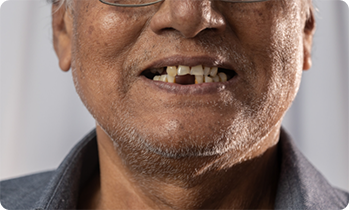
While teeth can be replaced one at a time with individual implants and restorations, there’s a better way to fill in the space left by multiple adjacent teeth all at once. A dental bridge made of two crowns and prosthetic teeth can be anchored in place using just two implant posts. Instead of altering nearby healthy teeth, which normally serve as anchors for a traditional bridge, we can use implant posts to secure your new teeth into place. Also, if your teeth are not consecutively missing, we can create a partial that fits on top of two or more dental implants to restore your smile.
Missing All Teeth

Normally, dentures only rely on the natural suction between their acrylic base and your gums to stay in place without slipping. Eventually, though, the shape of your mouth will change, and traditional dentures won’t fit as well as they used to. You can avoid this issue with a full arch of false teeth supported by four or more implants. Not only will you be able to resume eating your favorite foods and speaking with greater clarity, but you’ll never need to worry about your implants slipping or falling out of your mouth, allowing you to embrace a full and happy life.
Learn More About Implant Dentures
Understanding the Cost of Dental Implants

Before you commit to getting dental implants in Little Rock, it’s important that you fully understand the kind of investment you’re making. Implants have a higher price point than traditional dentures or bridges; however, because of their long lifespan, they can end up saving you money. The overall cost of the procedure will be determined at your consultation; we need to decide how many posts are needed and take any additional procedures that might be necessary into account.
Preliminary Treatments & Surgery

Getting dental implants requires multiple appointments, which each incur their own unique cost. There’s the surgical placement of the implants themselves. Unlike many dental practices, we can perform this portion of the treatment in our own office without having to refer you to an outside specialist. Then there may be another minor surgery to place your abutments (small metal attachments that connect your implants to your restorations). Lastly, there’s the placement of the crown, bridge, or denture that goes on top of the abutments.
Some patients may require preparatory treatments, such as gum disease therapy or bone grafting before implants can be placed. Luckily, we can provide these procedures in-house.
Cost-Affecting Details of Your Treatment
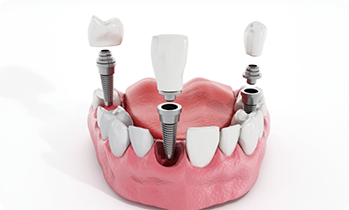
One of the most influential factors in the cost of dental implants is how many posts you’ll need to rebuild your smile. For patients missing only one tooth, we can place a single implant and top it with a realistic dental crown. Other patients might be missing two or three teeth in a row that can be replaced by suspending a dental bridge in between two implants. Patients who are missing all teeth on one or both arches can receive a full denture anchored by four to eight implants. It should come as no surprise that the more implant posts you need, the more your treatment will cost.
Final Dental Implant Restoration
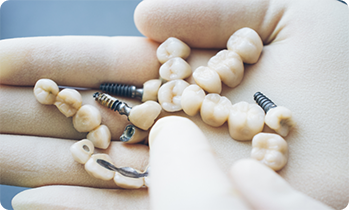
The restoration that will be attached to your dental implants is custom-crafted for your specific mouth, so you’ll be able to choose what types of materials you want them made from. Many patients opt for more comfortable, natural-looking materials like gum-colored acrylic for the base and porcelain replacement teeth because they mimic the appearance of natural tooth enamel by reflecting light. However, the choice will be completely up to you! Your implant dentist in Little Rock will discuss each of your options with you at your initial consultation, along with any pricing details.
Are Dental Implants Worth the Cost?

Dental implants are by far the most advantageous way to replace missing teeth. They prevent the jawbone deterioration that’s common after tooth loss, keeping the bone healthy and supporting your facial muscles so that they don’t sag or wrinkle prematurely. They also provide more stability and a chewing power that’s virtually indistinguishable from your natural teeth.
While traditional bridges or dentures might seem cheaper, they have to be replaced every few years. By contrast, dental implants can last 30+ years with proper maintenance (daily brushing and flossing, regular dental checkups, etc.). In the long run, dental implants might actually save you money!
Will Dental Insurance Cover the Cost of Dental Implants?

Many dental insurance plans consider implants a cosmetic procedure, so they don’t cover the cost of the implants themselves. However, you may be qualified for coverage for other portions of the treatment, like bone grafting or your restoration. Our practice is in-network with a wide range of dental insurances, and we’re even willing to work with out-of-network policies as well.
Making Dental Implants Affordable

For those without insurance, our team can help you apply for CareCredit – a third-party financing plan that allows you to fund your dental care by breaking your payment up into monthly installments that can fit into almost any budget. Better yet, they have incredibly low interest rates! If you’d like to learn how to apply, contact our office today.
Advanced Dental Implant Procedures

If you are not initially considered a good candidate for dental implants, you still may be able to get them in the future! With advanced dental implant procedures like bone grafting, sinus lifts, and ridge expansions, we can help you overcome common obstacles that may be standing between you and your new smile. Once you’ve healed, we can begin your dental implant treatment! While these advanced procedures may add some time to your treatment timeline, they’ll help ensure that your implants are successful and last a lifetime.
Bone Grafting
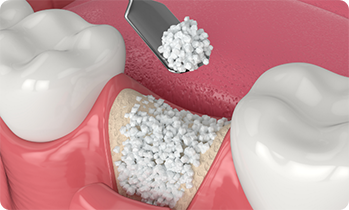
To form a strong, reliable foundation for your new teeth, your dental implants will need to integrate with your jawbone. However, if you lack jawbone density, there won’t be enough tissue to fuse with the dental implants, and they may fail. Many patients who have significant tooth loss or have been missing teeth for a long time don’t have enough jawbone density to get dental implants because the bone tissue naturally starts to deteriorate after tooth loss. Thankfully, a bone graft can often resolve this!
A bone graft is a procedure that encourages the body to restrengthen the jawbone. We’ll make a small incision in the gums to access the weakened areas of the jaw. Then, we’ll place the grafting tissue directly onto the area, which may either be taken from another part of your body or a donor. Once in place, the new tissue will begin to integrate with your jawbone, naturally stimulating new bone tissue as well. While this process often takes several months, it is essential for the longevity of your dental implants.
Sinus Lifts
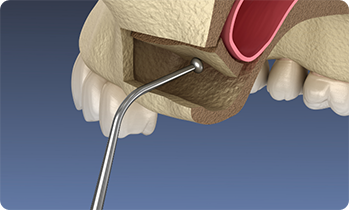
Your jawbone is thinner above your back upper molars. Just above this area is where your sinus cavities sit. If this already thin area of your jawbone shrinks even more, placing dental implants there may poke into the sinus cavity. Thankfully, a specialized type of bone graft called a sinus lift can help with this matter.
For a sinus lift, we will open the gums and thin area of the jawbone to expose the membrane holding the sinuses. Carefully, we’ll push this membrane up and fill the space with grafting material, which again, will either be taken from elsewhere on your body or a donor. Like a bone graft, this will naturally encourage new bone growth in that area, thickening the jawbone and creating better conditions for placing a dental implant.
Ridge Expansion
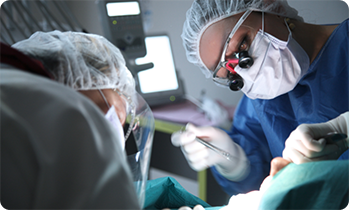
When the jawbone is too weak to support dental implants or isn’t wide enough to accommodate them, a ridge expansion can help provide the needed foundation. For this type of procedure, the bone ridge running along your top and bottom jaws is carefully and precisely divided into smaller segments. Once space has been made between the inner and outer parts of the ridge, grafting material will be used to fill it. A ridge expansion can be particularly helpful for patients with moderate jawbone loss since it can help improve both the height and width of the jawbone.
Dental Implant Failure & Salvage

By committing to renewing your missing teeth with dental implants, you’re making a worthwhile investment for a long-lasting smile. While this treatment has an incredible success rate of 95% even 10 years after being placed, there’s still a chance your metal posts could fail. If you start to notice any indications of a failed dental implant, you’ll want to notify our team as soon as possible. We might be able to preserve your newly rebuilt pearly whites with dental implant salvage in Little Rock.
Learn More About Dental Implant Failure and Salvage
Maintaining & Caring for Dental Implants

After investing in your new smile, it makes sense that you’ll want to know all of the tips for dental implant care in Little Rock so you can ensure they last a lifetime. With routine visits to our team and the right at-home maintenance, your new smile can last for 35 years or longer, which is four times the average lifespan of traditional prosthetics! Below, we’ve outlined some basics for caring for your dental implants. If you have any additional questions or concerns, don’t hesitate to call our office!
Prioritize Your Oral Hygiene

Just like with your natural teeth, it’s important to maintain a good at-home oral hygiene routine with your new implant-retained prosthetics. This includes brushing twice each day for two minutes with a soft-bristled toothbrush, rinsing with an alcohol-free antimicrobial mouthwash once a day, and flossing at least once every day. This will prevent harmful bacteria accumulation and tartar build-up.
Eat a Balanced Diet

Oral bacteria are known to lead to common problems, like cavities and gum disease, and love to feed off sugars and carbohydrates that are found in foods. That’s why it’s important to try to maintain a balanced diet, and whenever you’re able to, substitute processed snacks for fresh fruits and vegetables.
Break Bad Oral Habits

If you use tobacco products, bite your fingernails, chew on ice, or have any other habits that could impact the health of your teeth and gums, it’s time to consider breaking them or cutting them back for the sake of your dental implants in Little Rock. We recommend consulting with your primary care physician on ways you can start your journey to quit smoking, and we’re also happy to offer suggestions for alternatives to other oral habits.
Protect Your Dental Implants

If you grind and clench your teeth at night or participate in any sports, we recommend investing in a custom-fitted nightguard or athletic mouthguard. These will prevent your prosthetics from breaking and shield your facial muscles and jaw joints as well, reducing your risk of developing related conditions, like TMJ disorder.
Schedule Your Routine Checkups & Cleanings

Be sure to visit your implant dentist in Little Rock once every six months for a routine checkup and cleaning. During this appointment, our team will examine your smile and take X-rays, looking for any early signs of potential oral health problems. We’ll then discuss our findings with you, along with our treatment recommendations. With regular preventive appointments, we aim to stop any small issues from becoming more serious down the road by addressing them early on.
Dental Implant FAQs
How long do dental implants last?
The lifespan of dental implants is significantly longer than other restorations. In fact, dental implants can easily last for 30 years or more with proper care! Meanwhile, traditional bridges and dentures typically must be replaced every 7 to 15 years.
To ensure your dental implants stay in great shape for as long as possible, follow these tips:
- Brush twice a day for a full two minutes each time
- Floss daily and rinse with mouthwash
- Avoid chewing on hard items like pens or ice cubes
- Never use your teeth to open packaging
- Visit an implant dentist in Little Rock every six months for a routine checkup
Am I too young to get dental implants?
In general, people’s jaws are not fully developed until young adulthood. For this reason, dental implants are usually not recommended for patients younger than 18 years of age. Placing dental implants before the jaw is finished growing could interfere with future bone development and lead to implant complications. If you are missing teeth at a relatively early age, you may want to consider an alternative restorative treatment for now and revisit dental implants in the future.
Can I get dental implants if I’m diabetic?
If you have lived with diabetes for a while and your condition is under control, dental implants are likely a viable tooth replacement option for you. However, if you experience chronic high blood sugar, you may need to talk to your primary care physician first before setting up a consultation with an implant dentist in Little Rock. Uncontrolled diabetes can slow down the healing process, which makes it harder for an implant to fuse with the jawbone. To ensure your implant treatment is successful, work with your doctor first to get your blood sugar levels under control.
Do dental implants make you look younger?
Yes! Many people do not realize this, but the force from biting and chewing spreads through the roots of your teeth and stimulates your jawbone. When teeth go missing, that important stimulation is also lost. As a result, your jawbone may begin to deteriorate over time, leaving your face looking sunken and wrinkled. Fortunately, dental implants in Little Rock replace both missing teeth and the tooth root structure. In fact, implants are the only dental restoration that can keep you looking young by stimulating the jawbone similar to natural teeth.
Will I have to take off work for dental implant surgery?
Most patients who undergo implant treatment only need to take one to two days off to rest and recover. However, your recovery period may depend on your specific job. Heavy physical activity or exercise can divert blood away from an implant and slow down healing. If your job involves physical labor, you may need to request a few extra days or schedule your implant surgery around a long weekend.




